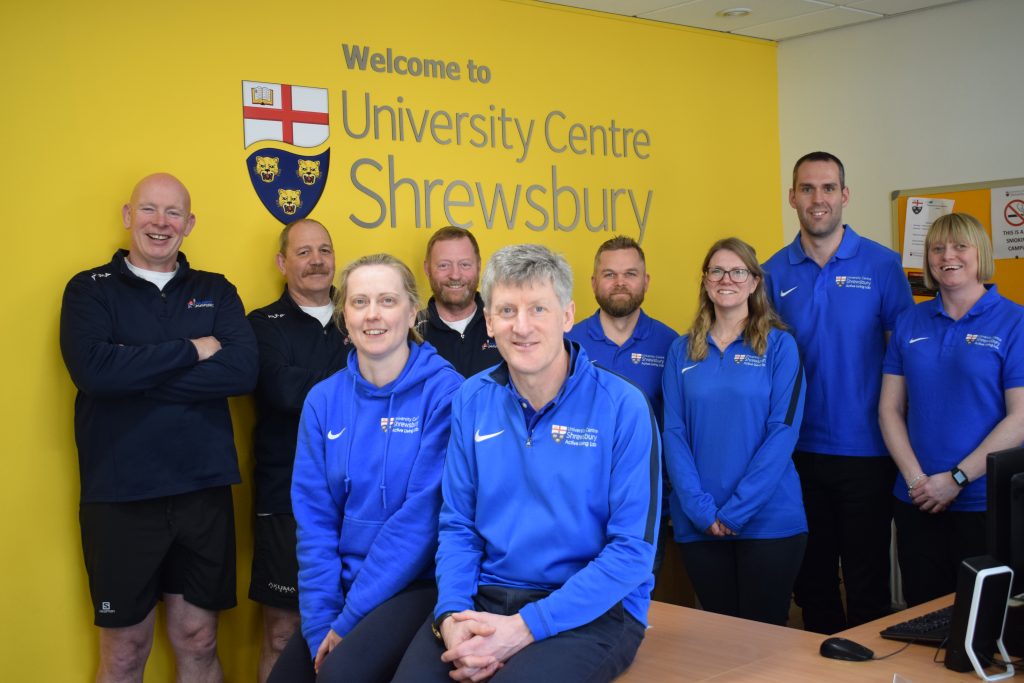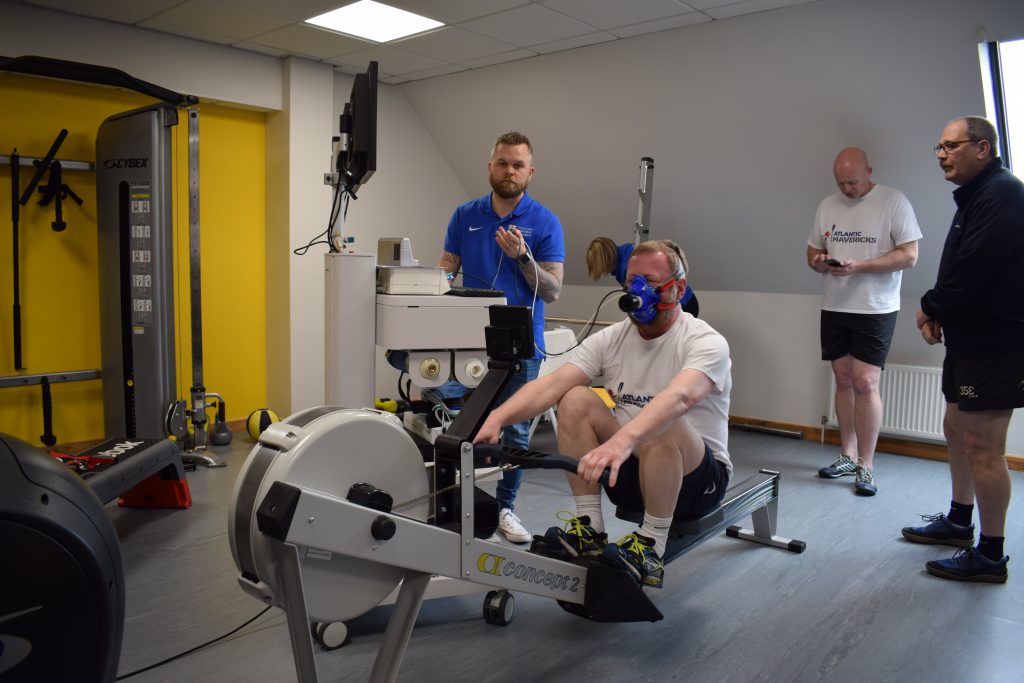News from our partners: How to get four middle-aged men across the Atlantic Ocean in a row boat
News from our partners University Centre Shrewsbury
How should four men in their 50s prepare for one of the world’s most arduous mental and physical endurance races? What happens to their bodies when they undertake such a physical challenge? Are they better or worse off physically when they finish?
These are among the questions that University Centre Shrewsbury’s Centre for Active Living will be addressing as they provide health and training advice to the Atlantic Mavericks, a rowing team of four men in their 50s (two of whom are from Shropshire) who plan to row 3,000 miles across the Atlantic Ocean, from the Canary Islands to Antigua & Barbuda, in 45 days. Known as the world’s toughest row, it is a gruelling race that will take a physical and mental toll on the men.

(from left in dark shirts): The Atlantic Mavericks: Roy Dixon, Richard Baker and Ian Davies. Front centre: Joanna Pike, physiotherapist, Royal Shrewsbury Hospital and John Buckley, Prof Exercise Medicine, University Centre Shrewsbury. Back from left: Sue Taylor, UCS Exercise Lecture; Chris Kite, exercise physiology lecturer UCS; Liz Howard, cardiac scientist, St. George’s Park; Chris Ellis, cardiac scientist, RSH.
John Buckley, Professor of Exercise Medicine at UCS, said:-
“We want to reduce as much as possible the controllable short-term harms of such an event to prevent any lasting harm. Our primary aim is to get them to the start-line with the right amount of strength, endurance and flexibility. During the race, it will then mainly be a battle of psychological will and teamwork.”
To advise and support the Mavericks, Buckley is co-ordinating a team from UCS and the Royal Shrewsbury Hospital (RSH) of exercise scientists, cardiovascular medicine specialists, physiotherapists, nutritionists and psychologists.
The Mavericks will work in pairs as they cross the Atlantic, rowing and sleeping in two-hour cycles. They will face the unpredictability of the swells and squalls of the sea, high winds, scorching sun, torrential rain, and an ocean of salt water and sharks. They will eat cold, pre-packaged dehydrated food, and use a bucket as their toilet. Each rower will drink 10 litres of water and burn more than 5,000 calories a day, and face losing up to a stone in weight. Together they will have completed more than 1.5 million oar strokes when they reach the finish line.
Despite claiming that they are “ordinary chaps”, it requires an extraordinary amount of mental toughness to consider such a journey.
Ian Davies, Atlantic Maverick rower, said:-
“Rather than dashing off to buy a sports car, we’ve spent our money on buying a boat that will push us to our limits, in aid of charity, and achieve something quite unthinkable and remarkable. We want to give back and inspire others by showing no matter what your circumstances or age, you can still achieve the seemingly impossible.”
Buckley’s Exercise Medicine Team at UCS, have now evaluated the Mavericks’ hearts, lungs, bones and joints along with aerobic fitness, strength and flexibility. Dr Tom Ingram, cardiologist at RSH, is leading the medical evaluations to check for any underlying health conditions that could affect their preparations. Once the results and their current training programme are assessed, the UCS Exercise team will create a holistic training package of exercise, nutrition and psychological guidance.
One of the biggest psychological challenges with highly driven people like the Mavericks is convincing them to take scheduled physical and mental rests.
John Buckley said:-
“Overtraining can be just as detrimental to performance as does not
enough training. Lack of rest periods during training is the biggest cause of injury and health issues. We want to find the optimal zone where they are physically and mentally prepared and injury free when they arrive at the start-line.”
For the UCS team this work is also a teaching and research opportunity for the postgraduate Exercise Medicine students. Students get frontline experience in assisting in the assessment of the Mavericks’ hearts, muscles and joints and then seeing the effects during training and when they complete the challenge. Current
research has focused on younger athletes, but with more and more people in the population over the age of 60, Buckley notes, it is important for us to better understand the threshold between not enough and too much exercise in this older cohort.
The Mavericks – Roy Dixson, Richard Baker and Ian Davies – are retired servicemen who forged their friendship on the rugby pitch. As part of their challenge, they will be raising both awareness and funds for several worthwhile charities including Myeloma UK and 353. The Talisker Whiskey Atlantic Challenge is the world’s premier ocean rowing event with approximately 30 teams from across the world taking on the unique challenge of crossing the ocean in a row boat this year. They will begin in early December 2019.
UCS’ Centre for Active Living performs research across all elements of physical activity linked with health, including those beyond traditional sport and fitness settings such as workplace design, the built environment and transport. The Centre offers a BSc in Health and Exercise Science that leads to qualifications in personal coaching and training, health and exercise rehabilitation and public health and public health promotion, as well as a MSc in Exercise Medicine that focuses on exercise in health, disease management and prevention.
University Centre Shrewsbury offers 16 undergraduate and nine post-graduate degrees. Now in its fourth year, UCS provides a high quality, personalised education with employability at its core, in one of England’s finest medieval towns.
Photo 1 (from left in dark shirts): The Atlantic Mavericks: Roy Dixon, Richard Baker and Ian Davies. Front centre: Joanna Pike, physiotherapist, Royal Shrewsbury Hospital and John Buckley, Prof Exercise Medicine,
University Centre Shrewsbury.
Back from left: Sue Taylor, UCS Exercise Lecture; Chris Kite, exercise physiology lecturer UCS; Liz Howard,
cardiac scientist, St. George’s Park; Chris Ellis, cardiac scientist, RSH.


